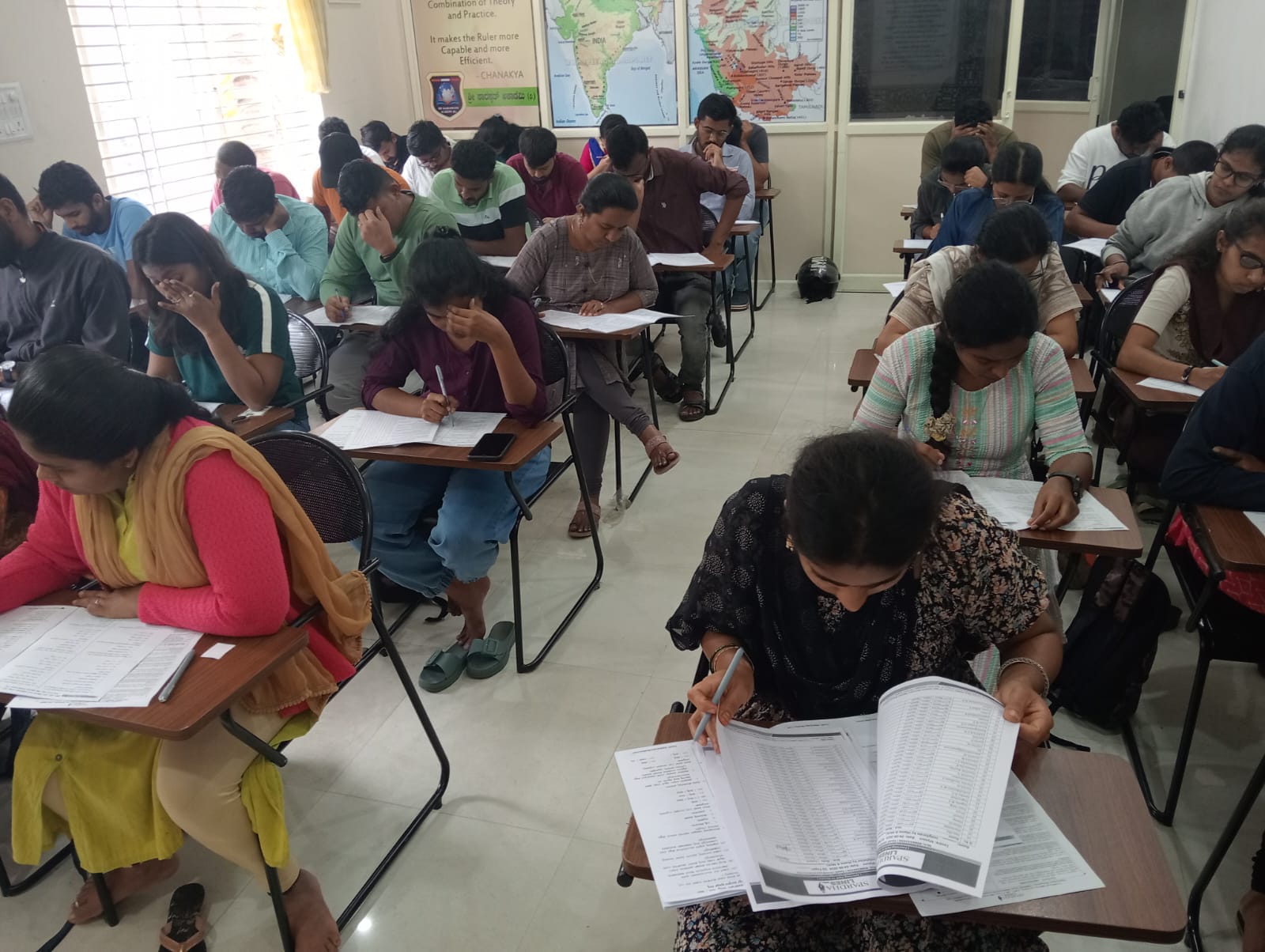-
 Mock TestSpardhalines
Mock TestSpardhalines -
 NCERT Founadtion CourseSpardhaLines
NCERT Founadtion CourseSpardhaLines
Current Affairs
Karnataka’s Public Health Infrastructure:

Topic : Society/ Economy ( GS-1)
Context: The Comptroller and Auditor General (CAG) report on Karnataka’s Public Health Infrastructure (2016–2022) highlighted gaps in implementing the Karnataka Integrated Public Health Policy.
Key issues in Karnataka’s Public Health Infrastructure :
Non-adoption of national norms and inadequate state-prescribed norms.
- Manpower shortages, with vacancies for doctors, nurses, and paramedics ranging from 29% to 53%, and AYUSH hospitals facing a 59% vacancy rate.
- Staffing norms for hospitals with over 300 beds not specified, and no action plan to address gaps.
- Maternity services impacted by staff shortages, drug unavailability, and lack of prescribed tests.
- Medicine storage norms not followed in test-checked hospitals.
- The report calls for urgent improvements in staffing, resources, and adherence to standards.
Karnataka Health Schemes:
- Ayushman Bharat – Arogya Karnataka Scheme (AB-ARK)
- This scheme provides financial assistance to patients with critical illnesses who are below the poverty line.
- It offers access to primary, secondary, and tertiary healthcare at enlisted hospitals in Karnataka.
- Karnataka Arogya Sanjeevini Scheme (KASS)
- This cashless scheme provides comprehensive healthcare for government employees and their families. It covers both Allopathy and AYUSH systems of medicine.
- Jyothi Sanjeevini Scheme (JSS)
- This cashless health assurance scheme is for state government employees and their dependents.
- It covers critical illnesses requiring tertiary care up to Rs. 1.5 lakh per year.
- Yeshasvini Health Insurance Scheme
- This scheme provides financial aid of up to Rs. 5 lakh per year for eligible patients.
- It covers more than 1650 different diseases at network hospitals.
- Karnataka Brain Health Initiative
- This initiative aims to develop a model for preventing and caring for neurological diseases.
- It also sets up a collaboration-based service for neurological disorders.
- Karnataka Epidemic Diseases Act, 2020
- This act unifies and consolidates the laws relating to the regulation and prevention of epidemic diseases in Karnataka.
- SHORTS:
- The Comptroller and Auditor General (CAG) report on Karnataka’s Public Health Infrastructure (2016–2022) highlighted gaps in implementing the Karnataka Integrated Public Health Policy.
- Non-adoption of national norms and inadequate state-prescribed norms.
- Manpower shortages, with vacancies for doctors, nurses, and paramedics ranging from 29% to 53%, and AYUSH hospitals facing a 59% vacancy rate.
- Staffing norms for hospitals with over 300 beds not specified, and no action plan to address gaps.
December 14, 2024 Category: Current Affairs Day Wise
Related Articles
Biodiversity Management Committees (BMCs):
Topic : Environment
Context: The Karnataka High Court issued notice on a PIL seeking the formation of Biodiversity Management Committees (BMCs) in all Gram Panchayats, taluks, and districts for biodiversity conservation.
Highlights :
- The petitioner stated that he had requested the Rural Development and Panchayat Raj to form BMCs in every Gram Panchayat, taluk, and district, especially in Tumakuru, as per Section 41 of the Biological Diversity Act, 2002, and its 2023 amendment.
- However, his request was not considered.
About Biodiversity Management Committees (BMC):
As per the Biological Diversity Act 2002, BMCs are created for “promoting conservation, sustainable use and documentation of biological diversity” by local bodies across the country.
- Composition:
- It shall consist of a chair person and not more than six persons nominated by the local body, of whom not less than one third should be women and not less than 18% should belong to the Scheduled Castes/ Scheduled Tribes.
- The main function of the BMC is to prepare People’s Biodiversity Register in consultation with the local people.
- BMCs are responsible for many tasks, including:
- Maintaining the People’s Biodiversity Register (PBR)
- Managing Biodiversity Heritage Sites
- Regulating access to biological resources
- Advising on matters referred to it by the State Biodiversity Board or Authority
- Maintaining data on local practitioners and “vaids” who use biological resources
- Channeling benefits from national, state, and local biodiversity funds
- Raising public awareness about the need to conserve biodiversity
- BMCs are established by local bodies such as Zilla Panchayats, Gram Panchayats, Nagar Panchayats, Municipal Panchayats, Municipalities, and Municipal Corporations.
- SHORTS:
- The Karnataka High Court issued notice on a PIL seeking the formation of Biodiversity Management Committees (BMCs) in all Gram Panchayats, taluks, and districts for biodiversity conservation.
- As per the Biological Diversity Act 2002, BMCs are created for “promoting conservation, sustainable use and documentation of biological diversity” by local bodies across the country.
- Composition: It shall consist of a chair person and not more than six persons nominated by the local body, of whom not less than one third should be women and not less than 18% should belong to the Scheduled Castes/ Scheduled Tribes.
- The main function of the BMC is to prepare People’s Biodiversity Register in consultation with the local people.
December 14, 2024 Category: Current Affairs Day Wise
412 Compressed Natural Gas (CNG) stations in Karnataka:
Topic : Economy ( GS- 1)
Context: As part of the Minimum Work Programme (MWP), 412 Compressed Natural Gas (CNG) stations have been established in Karnataka.
Highlights :
- The Minimum Work Programme (MWP) is a mandate set by the Petroleum and Natural Gas Regulatory Board (PNGRB) for city-gas distribution (CGD) entities. The MWP requires CGD entities to:
- Provide a minimum number of PNG connections
- Ensure equitable distribution of natural gas across the country
- Cover all charge areas through pipelines within their marketing exclusivity periods
- The Ministry of Petroleum and Natural Gas aims to establish an additional 1,414 CNG stations in the State by 2030.
- The establishment of CNG stations is part of the development of City Gas Distribution (CGD) network and the same is carried out by the entities authorised by the Petroleum and Natural Gas Regulatory Board (PNGRB).
- According to the data, Bengaluru Urban leads the tally with 77 stations, followed by Bengaluru Rural with 41, both managed by GAIL Gas Limited.
- The coastal district of Dakshina Kannada ranks next with 35 stations.
- Districts such as Ballari (21), Ramanagara (17), and Bidar (16) have also seen significant development.
About Petroleum and Natural Gas Regulatory Board (PNGRB):
- The Petroleum and Natural Gas Regulatory Board (PNGRB) is a statutory body that regulates the downstream activities of the petroleum and natural gas sector in India.
- The PNGRB was established in 2006 under the Petroleum and Natural Gas Regulatory Board Act, 2006.
- The PNGRB’s headquarters are in New Delhi, and its nodal ministry is the Ministry of Petroleum and Natural Gas.
- The PNGRB’s main functions include:
- Protecting consumers: The PNGRB promotes fair trade and competition to protect the interests of consumers.
- Ensuring adequate supply: The PNGRB ensures that there is an adequate supply of petroleum, petroleum products, and natural gas in all parts of the country.
- Establishing technical standards: The PNGRB establishes technical and safety standards for the petroleum and natural gas sector.
- Authorizing pipelines and networks : The PNGRB authorizes natural gas and petroleum product pipelines and CGD networks.
- Determining tariffs: The PNGRB determines tariffs.
- SHORTS:
- As part of the Minimum Work Programme (MWP), 412 Compressed Natural Gas (CNG) stations have been established in Karnataka.
- The Ministry of Petroleum and Natural Gas aims to establish an additional 1,414 CNG stations in the State by 2030.
- The establishment of CNG stations is part of the development of City Gas Distribution (CGD) network and the same is carried out by the entities authorised by the Petroleum and Natural Gas Regulatory Board (PNGRB).
- According to the data, Bengaluru Urban leads the tally with 77 stations, followed by Bengaluru Rural with 41, both managed by GAIL Gas Limited.
- The PNGRB was established in 2006 under the Petroleum and Natural Gas Regulatory Board Act, 2006.
December 14, 2024 Category: Current Affairs Day Wise
S Nijalingappa:
Topic : Person in News( Prelims)
Context: In a move mired in controversy, the residence of former Karnataka chief minister and AICC president S Nijalingappa in Chitradurga was finally sold to the Karnataka government, ending a four-year delay.
Highlights :
- The sale was finalised for about Rs 1 crore below market value.
- The property, a piece of Karnataka’s rich political history and built almost a decade before India’s Independence, was transferred to the state by Nijalingappa’s son, Kiran Shankar, through the jurisdictional tahsildar.
About S Nijalingappa:
Early Life:
- Born: 10 December 1902, Haluvagalu, Bellary district.
- Education: Graduated from Central College, Bangalore (1924); Law degree from Poona (1926).
- Role in Independence Movement
- Inspired by Mahatma Gandhi and Rajendra Prasad.
- Became President of Chitradurga District Congress Committee in 1936.
- Participated in the Forest Satyagraha (1939), lost bar license.
- Built the Congress movement in Mysore (dominated by Mysore Praja Paksh).
- Elected to Mysore Representative Assembly (1937) and led Mysore Congress (1938–1950).
- Contribution to Constitution-Making
- Elected to Constituent Assembly from Bombay on Congress ticket.
- Did not actively participate in debates.
- State Politics:
- First Chief Minister of Mysore state (1956).
- Completed Sharavathy hydroelectric project, improved irrigation in northern Karnataka, and resettled Tibetan refugees (1956).
- Faced factional struggles, ousted in 1958, lost Assembly elections (1962), but returned as Chief Minister thrice.
- National Politics:
- President of All-India Congress Committee (1968).
- Led the Syndicate faction against Indira Gandhi during the 1969 Congress split.
- Supported Neelam Sanjiva Reddy for President but lost to V.V. Giri.
- SHORTS:
- In a move mired in controversy, the residence of former Karnataka chief minister and AICC president S Nijalingappa in Chitradurga was finally sold to the Karnataka government, ending a four-year delay.
- About S Nijalingappa:
- Inspired by Mahatma Gandhi and Rajendra Prasad.
- Became President of Chitradurga District Congress Committee in 1936.
- Elected to Constituent Assembly from Bombay on Congress ticket.
- First Chief Minister of Mysore state (1956).
- Completed Sharavathy hydroelectric project, improved irrigation in northern Karnataka, and resettled Tibetan refugees (1956).
December 14, 2024 Category: Current Affairs Day Wise
Nandi Infrastructure Corridor Enterprise Ltd. (NICE):
Topic : Economy ( GS-1)
Context: NICE has been recognized for its exceptional work on the NICE 41 km Peripheral Road in Bengaluru, winning the award for Best Concrete Road (Rigid Pavement) – Construction and Maintenance in India at the Construction Times Award 2024.
Highlights :
The award ceremony took place on December 12, 2024, at Greater Noida, as part of bauma CONEXPO INDIA 2024.
- Renowned economist and former Member of Parliament, Dr. Subramanian Swamy, graced the event as the Chief Guest.
- NICE Road’s win demonstrates the company’s commitment to excellence in construction and maintenance.
- The award is a result of a rigorous evaluation process by a distinguished jury, considering parameters such as project execution, innovation, and sustainability.
About Nandi Infrastructure Corridor Enterprise Ltd. (NICE):
- Nandi Infrastructure Corridor Enterprise Limited is a Non-govt company, incorporated on 19 Jan, 1996.
- It’s a public unlisted company and is classified as ’company limited by shares’.
- Company’s authorized capital stands at Rs 12600.0 lakhs and has 99.2807% paid-up capital which is Rs 12509.37 lakhs.
- The company last updated its financials on 31 Mar, 2017 as per Ministry of Corporate Affairs (MCA).SHORTS:
- NICE has been recognized for its exceptional work on the NICE 41 km Peripheral Road in Bengaluru, winning the award for Best Concrete Road (Rigid Pavement) – Construction and Maintenance in India at the Construction Times Award 2024.
- The award ceremony took place on December 12, 2024, at Greater Noida, as part of bauma CONEXPO INDIA 2024.
- NICE Road’s win demonstrates the company’s commitment to excellence in construction and maintenance.
December 14, 2024 Category: Current Affairs Day Wise





